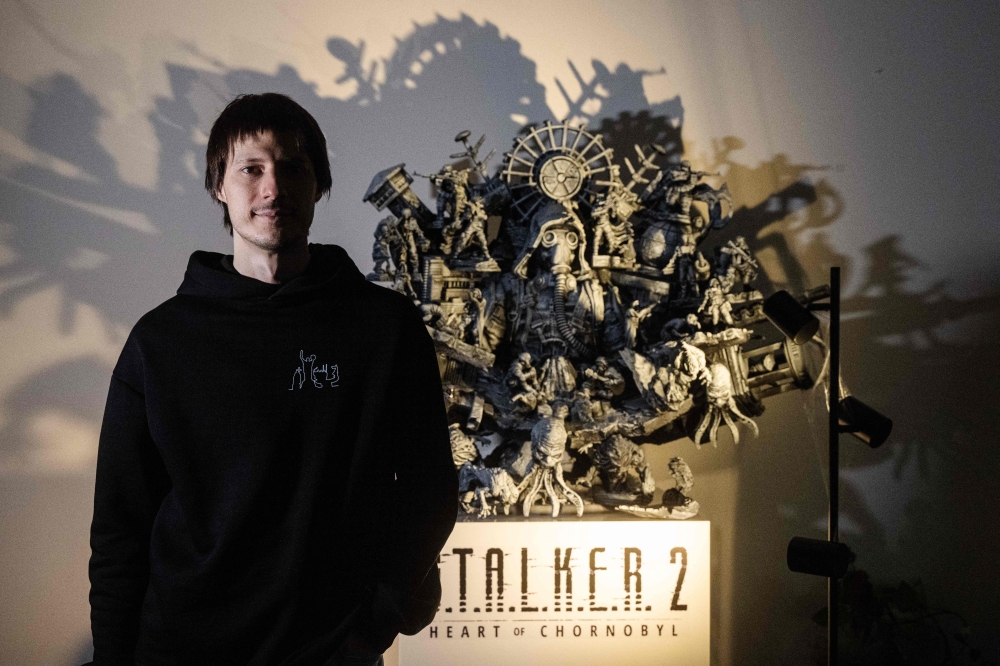PRAGUE, Nov 18 — Ukrainian studio GSC will on Wednesday release a long-awaited sequel to its hit S.T.A.L.K.E.R. video game, fine tuned during the Russian invasion which forced many of its staff to leave the country.
The post-Apocalyptic first-person shooter game is set in a fictional version of the exclusion zone around the Chernobyl nuclear power plant that was hit by a deadly accident in 1986.
The sequel, called S.T.A.L.K.E.R. 2: Heart of Chornobyl, was first announced in 2010 and postponed several times.
The November 20 release marks the end of a long and chaotic journey for the GSC Game World staff, some of whom have joined the army while others fled to Prague as Russia invaded Ukraine in February 2022.
The game’s contaminated zone is filled with danger where monsters and rival human groups run riot.
“The war affected our lives... (but) not the creative process,” chief executive Ievgen Grygorovych told AFP in the Czech capital.
Staff meet online, including a large weekly get-together for around 500 employees.
“Most have stayed in Ukraine, but we don’t feel like we have a split team,” Grygorovych added.
The Prague office includes three floors and a motion pictures studio, all adorned with Ukrainian flags as well as spider webs, a Halloween leftover.
The 38-year-old Grygorovych, born only days before the Chernobyl disaster, joined the studio founded by his brother at 14.
He describes himself as “a pretty good programmer, technical artist and game designer”.
“I’m introverted, and I didn’t like to spend energy by telling others what to do. So I learnt how to do everything myself,” he said.
But his expertise could not prepare him for the hasty exit from Ukraine, described in a documentary called “War Game: The Making of S.T.A.L.K.E.R. 2”, released in October.

‘Invasion affected us’
Most GSC staff left for western Ukraine on buses just before the invasion and continued to Prague via Budapest.
“The invasion affected us and the game too, because we became slightly different people,” said Grygorovych, who fled with his wife — a musician turned GSC manager, their little son and other family members.
GSC, which has also produced the Cossacks series, has since severed ties with Russian players, removing Russian voiceover and changing text labels to Ukrainian.
It has been relentlessly targeted by Russian hackers, an “irritating but manageable thing”, said Grygorovych.
“We had to build a much better security system,” he said. “But it had to be done anyway.” GSC raised over US$800,000 in charity sales for a Ukrainian organisation just after the war started.
Its Prague-based staff send money to friends, relatives and troops in Ukraine, while employees who joined the army are still on the payroll.
S.T.A.L.K.E.R. 2 will be released for PC and Xbox.
‘Abandoned place with tragedy’
“Stalker” refers to trespassers in the exclusion zone which Grygorovych calls “one of the most beautiful places on Earth” — “an abandoned place with a lot of tragedy” where nature takes over the drab Soviet-era architecture.
“You can see a tree growing on top of a five-floor building... it’s so frightening and strange. A very unique experience,” he said.
The game’s Ukrainian character is more contemplative and disillusioned than those in other shooter games created in the United States, Japan or elsewhere in Europe.
“We have a different culture, language, way of thinking,” said Grygorovych. “So the game is culturally different and played differently.”
GSC, which has sold over 15 million copies of S.T.A.L.K.E.R. games, introduced S.T.A.L.K.E.R. 2 at the Gamescom fair in Germany last year.
“The players who could play the game tell us that they can feel these old S.T.A.L.K.E.R. vibes and atmosphere, but it’s something completely new,” said Grygorovych.
GSC used the feedback to fix bugs, but Grygorovych said he was still driven by fear in the run-up to the release: “I want to be proud of what we all did.”
S.T.A.L.K.E.R. 1 gave rise to a populous fan community reading Stalker novels or gathering to reenact the game with airsoft guns.
“You just create art and it may happen that it becomes popular like this. So we are lucky, I guess,” said Grygorovych. — AFP

Motorola is all geared to launch its first laptop Moto Book 60 and Moto Pad 60 Pro on April 17 in In...

Google’s newly launched Pixel 9a is now available for purchase in India with availability across Fli...